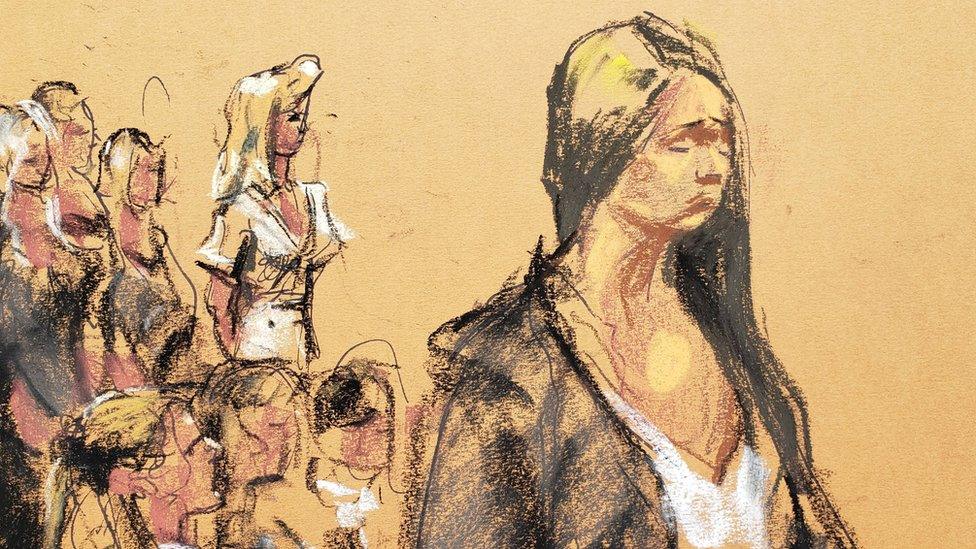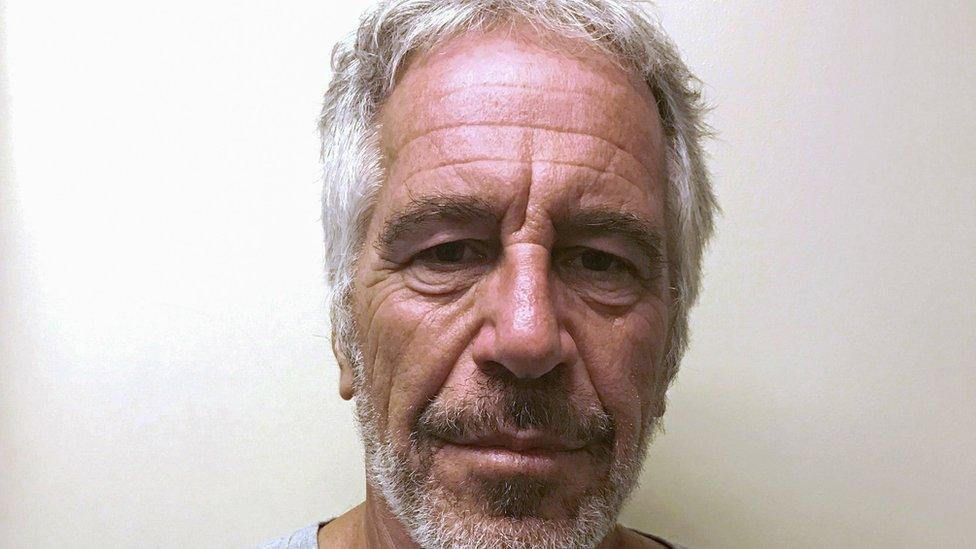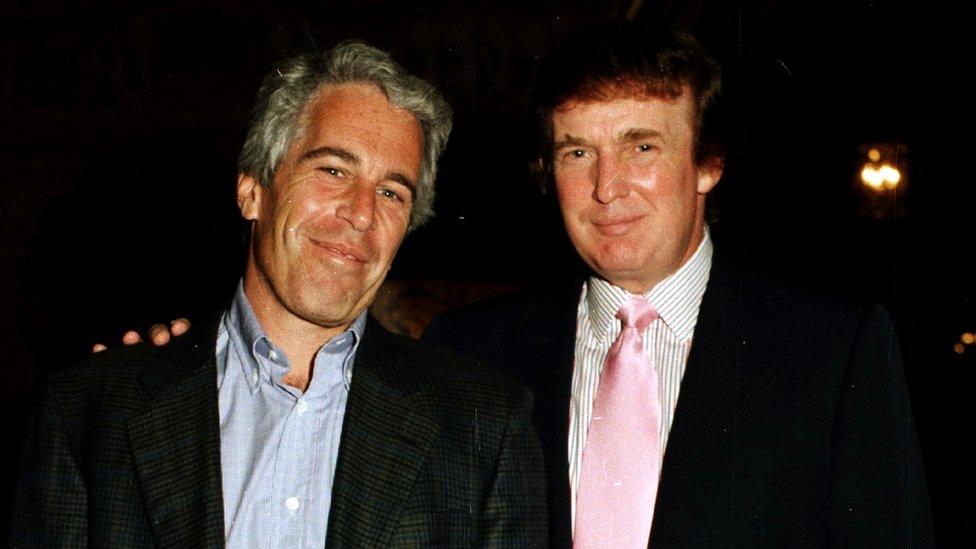Jeffrey Epstein accuser urges Prince Andrew to 'come clean'
- Published
Virginia Giuffre: Prince Andrew "knows exactly what he's done"
A woman who accused the late financier Jeffrey Epstein of sex abuse and alleged she was forced to have sex with Prince Andrew as a 17-year-old has urged the UK royal to "come clean".
Speaking after a hearing for alleged victims in the wake of Epstein's death, Virginia Giuffre told reporters the prince "knows what he's done".
The Duke of York denies the accusation.
Epstein killed himself in his prison cell this month while awaiting trial on sex trafficking and conspiracy charges.
The 66-year-old tycoon - who once counted President Donald Trump, former President Bill Clinton and Prince Andrew as friends - was found unresponsive on 10 August.
About 15 plaintiffs were given an opportunity to speak at the New York City court hearing that brings an end to the criminal case - which is now closed because of Epstein's death.
The women spoke of their anger, saying Epstein had cheated justice by taking his own life.
Prosecutors said the investigation was ongoing and charges could still be brought against any co-conspirators.
What did Ms Giuffre say?
Ms Giuffre, 35, has alleged she was forced on three occasions to have sex with Prince Andrew, which he denies.
She has accused Epstein of keeping her as a "sex slave". In court on Tuesday, she said: "My hopes were quickly dashed and my dreams were stolen."
Ms Giuffre has said in a court deposition she was a 15-year-old working at Mr Trump's Mar-a-Lago golf resort in Florida when she was approached by British socialite Ghislaine Maxwell to give massages to Epstein.
When asked for a comment on Prince Andrew during a news conference after the hearing, Ms Giuffre said: "He knows what he's done and he can attest to that. He knows exactly what he's done and I hope he comes clean about it."
The prince has said it was "a mistake and an error" to see Epstein after his release from prison, and that he never saw or suspected criminal behaviour.
What did the other accusers say?
Courtney Wild, who has alleged Epstein sexually abused her when she was 14, told the court on Tuesday: "I feel very angry and sad. Justice has never been served in this case."
Ms Wild, who says she was recruited to be a masseuse for Epstein on his private plane dubbed "the Lolita Express", called him a "coward" who was able to "manipulate our justice system".

Courtney Wild was among those to take to the stand
Jennifer Araoz, who says Epstein raped her at his New York mansion when she was 15, told the court: "He robbed me of my dreams, of my chance to pursue a career I adored.
"The fact I will never have a chance to face my predator in court eats away at me. They let this man kill himself and kill the chance for justice for so many others."
Another woman, Chauntae Davies, told the court: "I will not let him win in death."
Ms Davies said she was raped by Epstein on his private island after being hired to give him massages.
Another woman, who chose to withhold her name, fought back tears as she told the court: "We do need to know how he died. It felt like a whole new trauma. It didn't feel good to wake up that morning and find that he allegedly committed suicide."
A number of accusers have filed lawsuits against Epstein's estate. Two days before his death, he signed a will funnelling his $577m (£475m) in assets to a trust fund.

He targeted the young and vulnerable
Chris Buckler, BBC News, New York
This was testimony that should have been given during Epstein's trial. But cheated of that opportunity, the judge insisted it was only appropriate that it should be heard.
Some had written detailed accounts of their abuse, while others just said what they felt. None of it was easy.
Even in the quiet courtroom it was difficult to hear as one woman sobbed through a letter she had written to Epstein. The fact she had wanted to say something directly to him summed up the complicated relationship many had with a man who manipulated them.
Another woman said he had forced her into a "destructive" and exploitative relationship, but that it still didn't "feel good" when she heard that he had killed himself.
What shone through the stories was that there was a pattern to Epstein's behaviour. He targeted the young and vulnerable.
The girls he abused are now women. But robbed of their innocence and some of their childhood, it was clear that as adults they still feel the pain.

What was said about Epstein's death?
Judge Richard Berman, who scheduled the hearing, began on Tuesday by observing that the case had taken "a rather stunning turn of events".
Reid Weingarten, an attorney for Epstein, asked the judge to look into the circumstances of his client's death.
The financier died of "suicide by hanging" in the Metropolitan Correctional Center in Manhattan, according to a New York medical examiner.
Mr Weingarten said the defence was "sceptical of the certitude of the medical examiner's conclusion that this was suicide", citing issues with video surveillance.
Brad Edwards, a lawyer representing Epstein's accusers, told the court that the financier's "untimely death" was "curious" and made it impossible for the alleged victims to find justice.

Authorities have told the Washington Post that one hallway camera near Epstein's prison cell has unusable footage, external, though clearer footage was captured in the vicinity.
It is unclear what was visible in this footage, or why the other video was not usable.
The FBI and Department of Justice are investigating the incident to determine if there was any foul play.
What was Epstein charged with?
Epstein was accused of paying girls under the age of 18 to perform sex acts at his Manhattan and Florida mansions between 2002-05.
He was also alleged to have paid large amounts of money to two potential witnesses ahead of his trial, which was scheduled for next year.
Epstein, who pleaded not guilty, was facing up to 45 years in prison if convicted.
He was arrested on 6 July after landing in New Jersey on his private jet.
Epstein avoided similar charges in a controversial secret plea deal in 2008, instead pleading guilty to a lesser charge.
Handling of that case - which deprived Epstein's accusers the chance to confront him in court - has been closely scrutinised in recent months.
In July, US Labor Secretary Alex Acosta, a former Miami prosecutor, resigned over his role in the plea deal.

Jeffrey Epstein, left, with Donald Trump at the current president's Mar-a-Lago estate in Florida in 1997